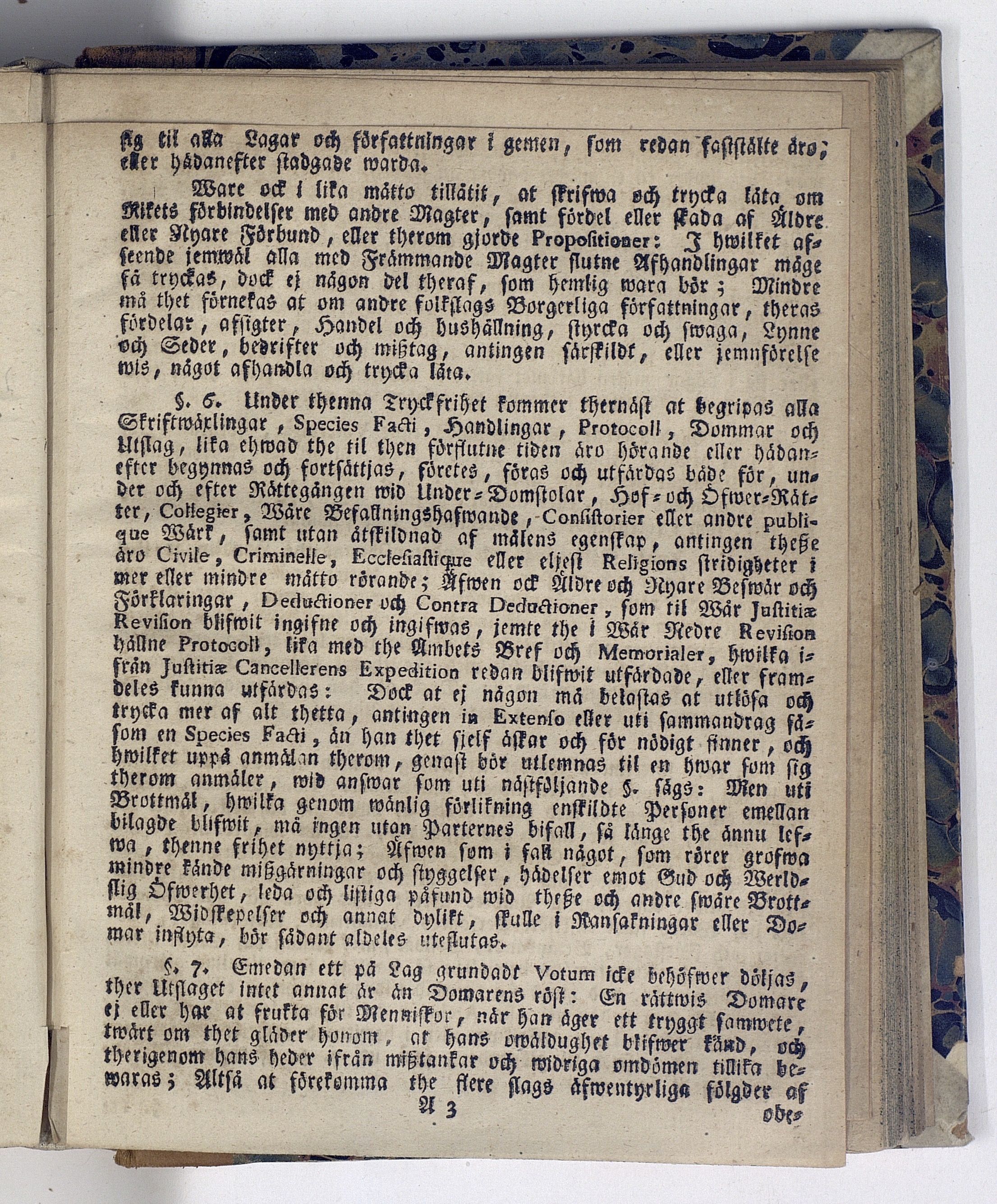PRIMARY SOURCES
ON COPYRIGHT
(1450-1900)
Source: Kongl. Maj:ts Nådige Förordning, Angående Skrif- och Tryck-friheten. Gifwen Stockholm i Råd-Cammaren then 2. Decembr. 1766. Tryckt uti Kongl. Tryckeriet.
Citation:
The Swedish Freedom of the Press Ordinance, Stockholm (1766), Primary Sources on Copyright (1450-1900), eds L. Bently & M. Kretschmer, www.copyrighthistory.org
Back | Record | Images | Commentaries: [1]
Translation only | Transcription only | Show all | Bundled images as pdf
to all laws and regulations that have already been passed or which may be promulgated hereafter.
To a similar degree it will also be permissible to write and allow to be printed material concerning the relations of the Realm with other powers, and this may include the advantages of or harm done by both older and more recent alliances or proposals to that effect. Similarly, all agreements made with foreign powers may also be printed, with the exception, however, of any part that ought to remain secret. There is even less reason to deny anyone the right to discuss and have printed material about the civil constitutions of other nations, their advantages, aims, commerce and economy, strengths and weaknesses, disposition and customs, achievements and mistakes, whether it be for specific purposes or for purposes of comparison.
§. 6. Furthermore, this freedom of the press will also include all exchanges of notes, species facti, documents, protocols, judgments and awards, whether they arose in the past or will be initiated, continued, conducted and executed in the future, and whether they were produced before, during or after proceedings before Lower Courts, Appeal Courts, Higher Courts, government departments, senior officials, consistories or other public bodies. This will apply irrespective of the nature of the cases, whether they be civil, criminal, ecclesiastical or concern religious disputes to a greater or lesser extent; it will also hold for both older and more recent appeals, statements of evidence, declarations and counter declarations that have been or will be submitted to Our Chamber of Court and Council as well as for the records made in our office of the Chamber and for official missives and memorials which already have been – or may in the future be – issued from the office of the Chancellor of Justice. No one, however, will be burdened with having to obtain and print more of all this material – whether in Extenso or in summary as a Species Facti – than he requests or considers necessary for his purposes. When requested, such material should immediately be provided to any applicant under pain of the penalties stated in the next paragraph. In criminal cases that have been settled by amicable settlement between private persons, no one may make use of this freedom without the permission of the parties involved during their lifetimes. Should anything concerning serious and less familiar misdeeds and abominations, profanities against God and secular superiors, wicked and cunning tricks in these and other serious cases, superstitions and other things of that kind appear in court proceedings or judgments, they should be completely excluded.
§. 7. A legally correct votum does not have to be concealed when the decision is nothing more or less than the vote of the judge: a just judge does not need to fear people when his conscience is clear – on the contrary, he will be pleased that his impartiality is recognised and his honour is consequently protected from suspicions and adverse opinions. Thus, in order to prevent the many kinds of hazardous consequence that result from
til alla Lagar och författningar i gemen, som redan faststälte äro, eller hädanefter stadgade warda.
Ware ock i lika måtto tillåtit, at skrifwa och trycka låta om Rikets förbindelser med andre Magter, samt fördel eller skada af Äldre eller Nyare Förbund, eller therom gjorde Propositioner: I hwilket afseende jemwäl alla med Främmande Magter slutne Afhandlingar måge få tryckas, dock ej någon del theraf, som hemlig vara bör; Mindre må thet förnekas at om andre folkslags Borgerliga författningar, theras fördelar, afsigter, Handel och hushållning, styrcka och swaga, Lynne och Seder, bedrifter och misstag antingen särskildt, eller jemnförelsewis, något afhandla och trycka låta.
§. 6. Under thenna Tryckfrihet kommer thernäst at begripas alla skriftväxlingar, Species Facti, Handlingar, Protocoll, Dommar och Utslag, lika ehwad the til then förflutne tiden äro hörande eller hädanefter begynnas och fortsättjas, företes, föras och utfärdas både för, under och efter Rättegången wid Under-Domstolar, Hof- och Öfwer-Rätter, Collegier, Wåre Befallningshafwande, Consistorier eller andre publique Wärk, samt utan åtskildnad af målens egenskap, antingen thesse äro Civile, Criminelle, Ecclesiastique eller eljest Religions stridigheter i mer eller mindre måtto rörande; Äfwen ock Äldre och Nyare Beswär och Förklaringar, Deductioner och Contra Deductioner, som til Wår Justitiæ Revision blifwit ingifne och ingifwas, jemte the i Wår Nedre Revision hållne
Protocoll, lika med the Ämbets Bref och Memorialer, hwilka ifrån Justitiæ Cancellerens Expedition redan blifwit utfärdade, eller framdeles kunna utfärdas: Dock at ej någon må belastas at utlösa och trycka mer af alt thetta, antingen in Extenso eller uti sammandrag såsom en Species Facti, än han thet sjelf äskar och för nödigt finner, och hwilket uppå anmälan therom, genast bör utlemnas til en hwar som sig therom anmäler, wid answar som uti nästföljande §. sägs: Men uti Brottmål, hwilka genom wänlig förlikning enskildte Personer emellan bilagde blifwit, må ingen utan Parternes bifall, så länge the ännu lefwa, thenne frihet nyttja; Äfwen som i fall något, som rörer grofwa mindre kände missgärningar och styggelser, hädelser emot Gud och Werldslig Öfwerhet, leda och listiga påfund wid thesse och andre swåre Brottmål, Widskepelser och annat dylikt, skulle i Ransakningar eller Domar inflyta, bör sådant aldeles uteslutas.
§. 7. Emedan ett på Lag grundadt Votum icke behöfwer döljas, ther Utslaget intet annat är än Domarens röst: En rättvis Domare ej eller har at frukta för Menniskor, när han äger ett tryggt samwete, twärt om thet gläder honom, at hans owäldughet blifwer känd, och therigenom hans heder ifrån misstankar och widriga omdömen tillika bewaras; Altså at förekomma the flere slags äfwentyrliga fölgder af












